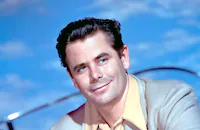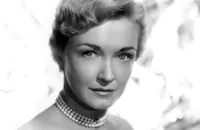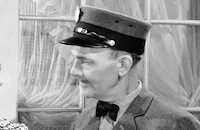The Undercover Man

Brief Synopsis
Cast & Crew
Joseph H. Lewis
Glenn Ford
Nina Foch
James Whitmore
Barry Kelley
David Wolfe
Film Details
Technical Specs

Synopsis
Treasury agent Frank Warren attempts to contact Manny Zanger, a man with access to information that would prove that mobster "The Big Fellow," the head of a major crime syndicate, is guilty of tax evasion, but Zanger is killed before the meeting takes place. Although the police capture the killer, they are unable to hold him because none of the witnesses will testify against him. The Treasury Department hopes to apprehend The Big Fellow on tax evasion charges, and to this end, confiscates bookkeeping records from his low-level associates. The T-men then arrest all the bookkeepers who work for the syndicate in order to compare their signatures to those on certain bank deposit cards. Before the T-men can complete this effort, however, Edward O'Rourke, the syndicate lawyer, obtains the bookkeepers' release. In frustration, Inspector Herzog, a police captain, quits the force. Sergeant Shannon, a policeman who, years earlier, abandoned his attempt to fight The Big Fellow, then shows Frank the record of Salvatore Rocco, a bookkeeper for the mob, whom he arrested before he was demoted to a desk job. When Frank learns that Rocco lives in the same neighborhood as Zanger's contact, he visits the apartment. Rocco's wife, angry because he has left her for another woman, admits that Rocco knew Zanger, but adds that she does not know Rocco's current whereabouts. She shows Frank a letter from Rocco, and Frank is pleased to discover that Rocco's handwriting matches that on the bank deposit cards. Frank and his associate persuade Rocco's girlfriend, Gladys LaVerne, to talk to Rocco. Gladys tells Frank that Rocco will testify if he gets federal protection and the reward. In exchange, Rocco asks his young daughter Rosa to bring him a notebook he had hidden at his former apartment, which contains the records of deposits he made for the mob. Before she can deliver it, however, Rocco is killed by the mob. When Frank returns from Rocco's funeral, his room has been searched and two waiting men beat him severely. Later, O'Rourke tries to make a deal with The Big Fellow and subtly threatens Judy, Frank's wife, who is staying at her parent's nearby farm. Deeply disturbed, Frank takes the next train to visit Judy and tells her that he intends to quit his job. After Frank's return to the city, Rosa and her grandmother visit Frank. Rosa's grandmother tells Frank that her husband died defying the Mafia in Italy, then gives him Rocco's book. A contrite Frank agrees to stay and fight The Big Fellow. The book contains almost all the evidence the Treasury Department needs to prosecute The Big Fellow. They then track down Sidney Gordon, another mob bookkeeper, in Los Angeles, and arrest him and his wife Muriel. Gordon agrees to cooperate and his testimony leads to the indictment of The Big Fellow and his associates. O'Rourke then sets out to buy off the grand jury. After O'Rourke is subpoenaed, he meets secretly with Frank and offers him a complete account of The Big Fellow's financial arrangements and also reveals that the jury has been bought. The mobsters discover his betrayal and kill him. Frank then uses O'Rourke's information to substitute a new jury for the corrupt one and The Big Fellow is sentenced to twenty years in prison.

Director

Joseph H. Lewis
Cast

Glenn Ford

Nina Foch

James Whitmore
Barry Kelley
David Wolfe
Frank Twiddell

Howard St. John
John F. Hamilton
Leo Penn
Joan Lazer
Esther Minciotti

Angela Clarke

Anthony Caruso
Robert Osterloh

Kay Medford

Patricia White

Peter Brocco
Everett Glass

Joe Mantell
Michael Cisney
Marcella Cisney
Sidney Dubin
William Vedder
Jim Drum
Robert Malcolm
Allen Mathews
Esther Zeitlin
Tom Coffey
William Rhinehart
Ralph Volkie
Al Murphy
Lynn Whitney
Ronnie Ralph

Billy Gray
Cy Malis
Jack Gordon
Silvio Minciotti
Virginia Farmer

John Butler
Rose Plumer
Richard Bartell
Ben Erway
Franklyn Farnum
Frank Mayo
Wheaton Chambers
George Douglas
Helen Wallace
Sammy Lamarr
Peter Virgo
Pat Lane
Brian O'hara
Joe Palma
Paul Marion
Edwin Max
Billy Nelson
William Stubbs
Ted Jordan
Glen Thompson
Roy Darmour
Wally Rose

Harlan Warde
Saul Gorss
Stella Lesaint
Tom Hanlon
Ken Harvey
Daniel Meyers
Franklin Parker
Alma Maison
Irene Martin
Ann Cameron
Bernard Sell
Ed Randolph
Crew
Sydney Boehm
Al Clark
George Duning
Jack Goodrich
Burnett Guffey
Walter Holscher
William Kiernan
Jean Louis
Wilbur Mcgaugh
Robert Rossen
M. W. Stoloff
Malvin Wald

Photo Collections
Videos
Movie Clip



Film Details
Technical Specs

Articles
The Undercover Man
The scenario finds T-Men Frank Warren (Glenn Ford) and George Pappas (James Whitmore) charged with getting the goods on a notorious crimelord (Ralph Volkie) solely referred to as "the Big Fellow." The feds receive a tip from informant Manny Zanger (Rob Osterloh) that the Big Fellow is avoiding $3 million in tax liabilities; however, Zanger turns up murdered before the evidence is delivered. Warren then takes the fight to the syndicate by subpoenaing the ledgers of the Big Fellow's low-level associates, and hauling in all their bookkeepers to compare handwriting.
The plan gets rebuffed, however, once slick mob attorney Edward O'Rourke (Barry Kelley) engineers the accountants' immediate release. Warren is back at Square One until an embittered local cop tips him to Salvatore Rocco (Anthony Caruso), a mob accountant whom he had once unsuccessfully tried to book. In tracking Rocco down, Frank discovers that his handwriting matches various critical mob deposit slips, and ultimately corners the accountant with a deal for immunity and protection in exchange for his testimony.
Rocco's decision to cooperate merely buys him a bullet. Afterwards, Frank receives a punking from the Big Fellow's hoods, and veiled threats from O'Rourke regarding the safety of his wife Judith (Nina Foch), who the T-man once believed to be safely ensconced at her parents' farm. Frank is on the precipice of turning in his badge when help--and incentive to bring the Big Fellow down--comes from unexpected corners.
Lewis' impressive string of noirs started with My Name Is Julia Ross (1945, also starring Foch) and So Dark the Night (1946) and continued with the genre classics Gun Crazy (1950) and The Big Combo (1955). The filmmaker recalled Ford's performance fondly for Peter Bogdanovich's 1997 director interview omnibus Who The Devil Made It (Knopf).
Of the scene where Frank tells Judith that he's ready to hang it up for her protection, and which was captured with a three-camera setup, Lewis stated, "This is a man crying, and it's wonderful to see a man cry--it's something rare and beautiful. I knew I could never capture this if we shot a portion of it on somebody else and then went over and over and over. I shot the rehearsal...I did not tell them how to do it. I did not tell them what I wanted. Again, this is where the talent of the actor and the actress came to me and gave me something brilliant that I could never explain to them. I sat back and I wept."
Lewis also stated to Bogdanovich that he severed his ties with Columbia over the claim to final cut made by Robert Rossen, the film's producer and co-scripter. "Immediately after I finished shooting, Bob called Harry Cohn and said, 'I'm finished with Joe Lewis, so you can knock him off salary'--or whatever terms were used. When I heard this I demanded that I be given an opportunity to edit the film and Bob said, 'Do anything you want and I'll change it my way. It's my film.'...He was wonderful to me during shooting, but the moment it was through--boom! Take it away from you. So I said, the hell with this, I'll leave. And I did. Harry Cohn had just given me a straight seven-year contract. And I left. I wouldn't stay."
Producer: Robert Rossen
Director: Joseph H. Lewis
Screenplay: Jack Rubin, Sydney Boehm; Malvin Wald (additional dialogue); Frank J. Wilson (article "Undercover Man: He Trapped Capone")
Cinematography: Burnett Guffey
Art Direction: Walter Holscher
Music: George Duning
Film Editing: Al Clark
Cast: Glenn Ford (Frank Warren), Nina Foch (Judith Warren), James Whitmore (George Pappas), Barry Kelley (Edward O'Rourke), David Wolfe (Stanley Weinburg), Frank Tweddell (Insp. Herzog), Howard St. John (Joseph S. Horan), John Hamilton (Police Sergeant Shannon), Leo Penn (Sidney Gordon), Joan Lazer (Rosa Rocco), Esther Minciotti (Maria Rocco), Angela Clarke (Theresa Rocco), Anthony Caruso (Salvatore Rocco), Robert Osterloh (Manny Zanger), Kay Medford (Gladys LaVerne)
BW-85m.
by Jay S. Steinberg

The Undercover Man
Quotes
Trivia
Notes
The film's working title was Chicago Story, according to an March 11, 1948 Los Angeles Times article, and it was to be shot on location in Chicago. The film begins with the following written and spoken foreword: "In the cracking of many big criminal cases-such as those of the John Dillinger, Lucky Luciano and Al Capone, among others-the newspaper headlines tell only of the glamorous and sensational figures involved. But behind the headlines are the untold stories of ordinary men and women, acting with extraordinary courage. This picture concerns one of these men." This film marked James Whitmore's film debut. A May 4, 1948 Los Angeles Times news item reported that some scenes were shot at Union Station in Los Angeles. Contemporary reviews noted that this film was loosely based on the events surrounding the arrest of Al Capone. CBCS credits both Ralph Volkie and Ken Harvey with the role of "The Big Fellow."














